新概念英语第二册 第六课 Lesson6 L6 Percy Buttons
新概念2册课件Lesson6
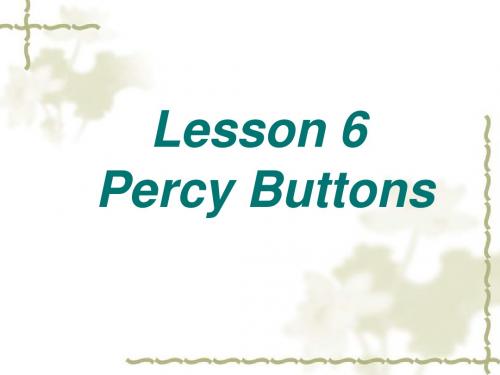
1. I shall call at your house this evening. 我今晚要来登门拜访.
2. a) Tom calls at Green’s office this morning. b) Tom calls on Green this morning.
汤姆今天上午看了格林。
I have just moved to ______ house in ______ Bridge Street. Yesterday ______ beggar knocked at my door. He asked me for ______ meal and ______ glass of beer. In return for this, ______ beggar stood on his head and sang ______ songs. I gave him ______ meal. He ate ______ food and drank ______ beer. Then he put ______ piece of cheese in his pocket and went away. Later _____ neighbor told me about him. Everybody knows him. His name is _____ Percy Buttons. He calls at every house in ______ street once a month and always asks for ______ meal and ______ glass of beer.
新概念第二册Lesson 6 Percy Buttons讲义
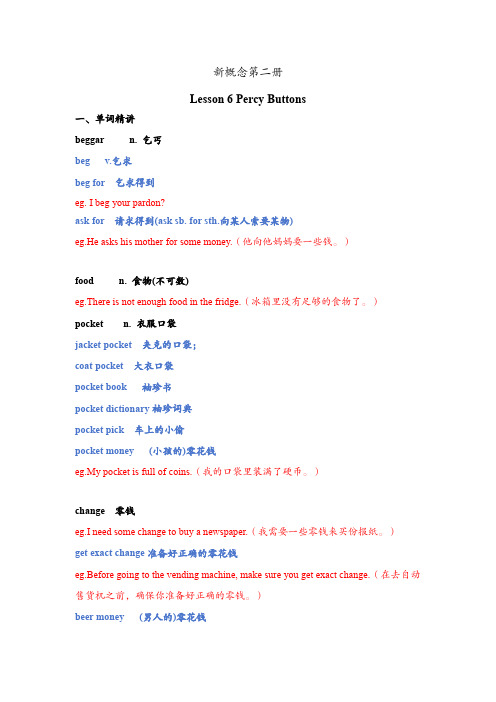
新概念第二册Lesson 6 Percy Buttons一、单词精讲beggar n. 乞丐beg v.乞求beg for 乞求得到eg. I beg your pardon?ask for 请求得到(ask sb. for sth.向某人索要某物)eg.He asks his mother for some money.(他向他妈妈要一些钱。
)food n. 食物(不可数)eg.There is not enough food in the fridge.(冰箱里没有足够的食物了。
)pocket n. 衣服口袋jacket pocket 夹克的口袋;coat pocket 大衣口袋pocket book 袖珍书pocket dictionary袖珍词典pocket pick 车上的小偷pocket money (小孩的)零花钱eg.My pocket is full of coins.(我的口袋里装满了硬币。
)change 零钱eg.I need some change to buy a newspaper.(我需要一些零钱来买份报纸。
)get exact change准备好正确的零花钱eg.Before going to the vending machine, make sure you get exact change.(在去自动售货机之前,确保你准备好正确的零钱。
)beer money (男人的)零花钱eg.He saved his beer money to buy a new fishing rod.(他把自己的零花钱存起来买了一根新的钓鱼竿。
)call v. 拜访, 光顾①vt.&vi. 叫,喊eg. I heard someone calling.call out =shout 大声喊②vt. 呼唤,召唤eg. Lucy is sick. Please call a doctor.③ vi. 访问,拜访;(车、船等)停靠call on sb.拜访某人call at+地点=visit someplace拜访某地eg. Amy called at our house yesterday.The train calls at large stations only. 这列火车只停大站。
新概念英语第二册第6课学习笔记

Lesson 6 Percy Buttons 珀西.巴顿【New words and expressions】生词和短语(4)beggar n.乞丐气 food n.食物pocket n.衣服口袋 call v.拜访,光顾☆beggar n.乞丐 beg v.乞求行乞重读闭音节, 需双写g。
类似的词有begin,run,swim,big,rob. beg(for)sth from sb 乞求…, 向…行乞ask sb for sth:请求得到某物beg sb for sth 恳求, 乞求(以谦虚的姿态要求)beg sb (not) to do sth 恳求某人(不要)做某事beg somebody off 为某人求情I beg your pardon?(1)I’m sorry./Excuse me.对不起, 请原谅!(2)Please repeat it./Pardon.请再说一遍。
☆food n.(1)(U)食物通常是不可数名词a lot of food(C)作为特种食品时, 可看做可数名词Baby foods 婴儿食品 health foods 健康食品Frozen foods 冷冻食品 breakfast foods 早餐a favorite foods 最喜欢的一种食物(3)food chain 食物链★pocket n.衣服口袋 ,衣袋inner pocket 内口袋; jacket pocket 夹克的口袋;coat pocket 大衣口袋 pocket book 袖珍书;pocket dictionary 袖珍词典 pocket money (小孩的)零花钱change零钱 get exact [ɪg'zækt]确切的,精确的change 准备好正确的零花钱beer money (男人的)零花钱(18世纪, 在小说里有时能见到女人的零花钱是针线钱。
但是随着时代的进步, 剩下的money都归女人管, 所以女人无零花钱。
新概念英语第二册Lesson+6+课件
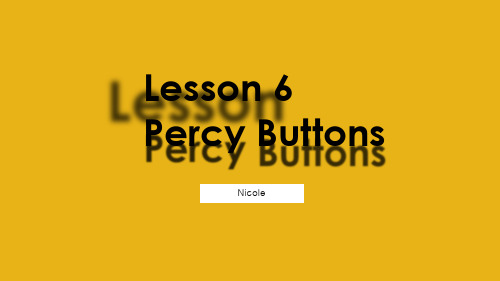
1975
1980
1985
1990
1995
2000
2001
• once a month 一个月一次, 单位表达方式
• once a year. • five kilometers an hour
tell you about him tell you about the word 解释这个单词的意思
•tell sb. sth. 告诉某人某件事(把事情直接告诉)
• tell you the news • tell you the word • 直接告诉这个单词
• 6. He calls at every house in the street once a month and always asks for a meal and a glass of beer.
ask (sb.) for sth =request for sth.
这个男孩又一次向父母要钱。
The boy asked (his parents) for money again.
老师要求他们重新打扫教室
The teacher asked them to clean the classroom again.
pocket pick 车上的小偷
beer money (男人的)零花钱
VIZSLA
call •1. 叫,喊
call me Jack call sb. +名字 叫某人…
Do you hear anyone calling me?
K•OcMalOl NoDuOt R=shout C大ESK声Y 喊TERRIER
新概念英语二lesson-6-Percy-Buttons(共34张PPT)
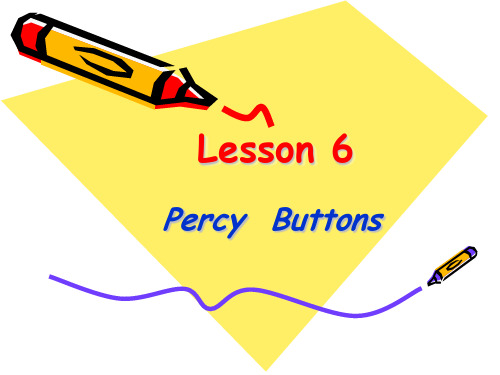
The usages of the articles
冠词是一种虚词,用在名词或名词词组的前 面,表示名词是特指还是泛指。冠词可分为不 定冠词( the indefinite article)和定冠词( the definite article)两种形式。 不定冠词 有 a, an。 定冠词有 the. 其中, a 用在发音以 辅音开头的名词之前, 而 an 则 用在 发音以 元音开头的名词之前。不定冠词的用法:
['beɡə]
②knock v.
[nɔk]
③return n. [ri'tə:n]
④meal n.
[mi:l]
⑤food n.
[fu:d]
⑥cheese n. [tʃiFra bibliotekz]⑦pocket n. ['pɔkit]
⑧neighbour n. ['neibə]
⑨ call [kɔ:l]
v.
乞丐;穷人 敲;打 返回;归还 一餐,一顿饭 食物 奶酪;干酪 衣服口袋 邻居 拜访,光顾
定冠词( the definite article)
1) 定冠词特指某(些)人或某(些)事物, 以区别 于同类中其他的人或事物。 Is this the book you are looking for? Do you know the man in back?
return n.归来,退还,报答,报复,汇报 eg: (I wish you) Many happy returns (of the day)!
(敬祝)多福多寿 Small profits and quick returns.
(商店广告用语) in return for 作…的报酬[回礼]
新概念第二册6
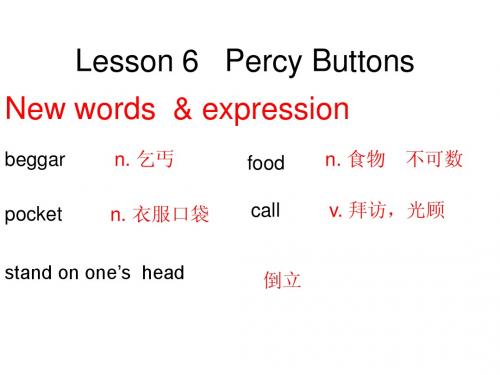
Lesson 6 Percy Buttons
tell sb sth:告诉某人某件事(把事情直接告诉), tell sb about sth,about:关于,通过其他事自己得出结论, tell you about him tell you the news
Lesson 6 Percy Buttons
beggar
beg v.乞求 I beg your pardon? beg for :乞求得到 ask for :请求得到
Lesson 6 Percy Buttons
call up sb:给某人打电话 call v. 拜访 我会拜访您。 你能让他回个电话吗? call on sb 拜访某人 Can you tell him to call back? I will call on you. call out =shout,大声喊 能帮我捎个信吗? 我会给你家里打电话。 Can you take a message for me? I will call at your home. call at+地点=visit someplace 拜访某地 光顾visit call sb:给某人打电话 call in sbபைடு நூலகம்招集和邀请某人 call back:回某人电话 为了这个项目,政府部门邀请了许多专家
Lesson 6 Percy Buttons
New words & expression
beggar pocket n. 乞丐 n. 衣服口袋 n. 食物 不可数
food call
v. 拜访,光顾
stand on one’s head
新概念英语第二册 Lesson 6 percy buttons
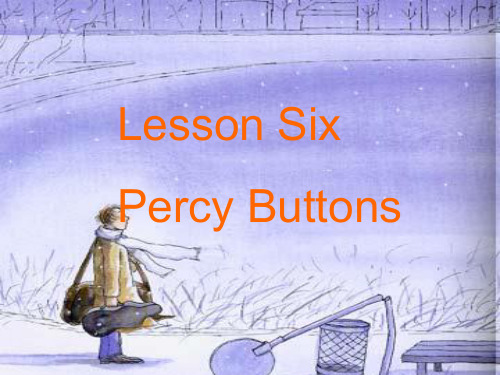
glass of beer.
( T
)
2.He put a piece of cheese in his pocket bag and went
away.
(
F )
)
3.The beggar calls at every house in the street once a week. month ( F ( T
knock 敲
call at 拜访
knock at 敲门
将遗失钱包归还失主
return 归还 in return for 作为报答
meal一顿饭
food食物
pocket口袋
take out把 ……拿出
put … in…
把……放入
Revision
1.Read these words and speak out their Chinese meanings.
4.He always asks for a meal and a glass of beer. )
Ⅴ. 巩固训练 回顾课文,并根据课文填空 I have just moved to a house in Bridge Street. Yesterday a beggar _______ door. He _____ knocked __my at asked me____a meal and a glass of beer. __ _____ for ___ for In return this, the beggar_____ __ __ ____ and sang songs. I stood on his head gave him a meal. He ate the food and drank the beer. Then he __of ____ __ ______in his pocket and____ a put piece cheese went away ____. Later a neighbor told me about him.Everybody knows him. His name is Percy Buttons. He____ calls __ at every house in the street once ____ __ _____ and always a month asks for a meal and a glass of beer.
新概念英语第二册Lesson 6课件

look at walk into
2023/6/1
knock的短语动词
2023/6/1
v. 敲,击,碰,撞 撞掉,撞落
下班
打折
撞翻,撞倒
打晕
打斗
拳击手 out
over
花盆
off
at
2023/6/1
烛台
失去知觉
The old lady knocked the thief out with a candlestick.
2023/6/1
Let’s call on John. call on sb.拜访某人 I called at your house yesterday. call at sp.拜访某地 You can call me tomorrow. 打电话 Somebody is calling over there. 喊,叫 I call my son Roby. 给…命名,称呼
2023/6/1
拜访 相当于visit 加地点
每个月一次 频率 提问用how often
要求…
2023/6/1
付款 be new to…对…不熟悉
2023/6/1
不能直接加从句
不能直接加人
直接加人 直接加从句
2023/6/1
多长时间
多少时间以后
一点 喊叫
街道
2023/6/1
块 请,叫,打电话 方式,道路
ask sb. for sth. 向某人要某物 ask him for some food
2023/6/1
作为对…的回报 stand的过去式 用(某种方式)
stand on one’s hands 用手倒立 stand on one’s knees 跪 lie on one’s back 平躺 lie on one’s side 侧躺
(完整版)(新概念英语第二册)Lesson 6 Percy Buttons 课件
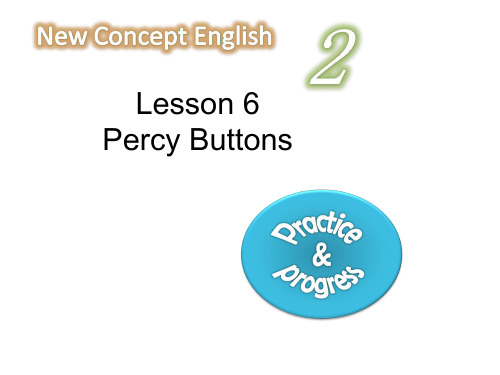
Key words and Expressions
• move to/move
• in return for,
in/move out,
• call at/call back/call
• knock at/knock
out/call in,
off/knock sth off+地点 • pocket/inner pocket,
• 3 Imagine you are very hungry, but have no money for a meal. What would you do?
Summary writing
1. Has the writer just moved to a house in Bridge Street or not?
• The writer has just moved to a house in Bridge Street. 2. Who knocked at her door yesterday?
• A beggar knocked at her door yesterday. 3. Did he sing songs, or did he ask for money?
(No, he hasn't.)
13 How often does he call on the houses in Br(iOdngcee a month.)
Street?
Follow the pattern :
tea S1:You drink a lot of tea, I must say! S2:I couldn't live without tea. It's my favourite drink.
新概念英语Lesson6PercyButtons课件

The The
the
the
the
the
the
6
Thank BuYtotouns
beg sb. for sth. • Beg people for money.
beg sb. to do sth. • I beg you to stay. 2. knock at/on the door 敲门
2
Percy Buttons
He asked me for a meal and a glass of beer. In return for this, the beggar stood on his head and sang songs.
Percy Buttons
改错
the light
the name a very big city
the name
the film
the director
a postcard/ postcards
冠词
➢ 零冠词 星期月季节假日, 球类运动无冠词, 三餐棋牌学科前, 统统都是零冠词。
Percy Buttons
用a/an/the填空 The
the
a
a
the
the
a
a
冠词
狗是一个可爱的动物。
× • Dog is a lovely animal.
单数名词不裸用
• A dog is a lovely animal. • The dog is a lovely animal. • Dogs is a lovely animal.
• __a__ one-year old boy • __a_n_ honest boy • _a__n_ hour • __a__ European
新概念英语第二册第6课完整

in return for this 作为对……的回报
He doesn't want anything in return.
4.In return for this, the beggar stood on his head and sang songs.
1. I have just moved to a house in Bridge Street. move vt. 移动,感动 vi. 移动,迁移 e.g. I have just moved in. 我刚刚搬进来。 在表达“搬家”这个意思时move可以单独使用,也可以组成短语move to, move into, move in, move out Jack has moved out. John will move in the day after tomorrow. 杰克已经搬走了。约翰后天搬进来。
Yes, she has.
A beggar.
He stood on his head and sang songs.
She gave him a meal.
New Lesson
6 He didn’t pay you for the meal, did he? No, he didn’t. 7 What did he do in return for it? He stood in his head and sang songs. 8 He ate the food and drank the beer. What did he do then? Then he put a piece of cheese in his pocket. 9 Who told you about him later? A neighbour did.
新概念2第6课
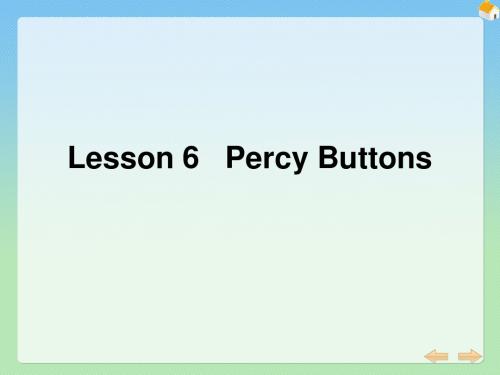
call on sb 拜访某人
I will call on you.=I will call at your home.
Listen to the tape and answer the questions.
1.Has the writer just moved to Bridge Street? Yes,she has. 2.Who knocked at her door yesterday? A bagger. 3.What did he do for a meal and a glass of beer? He stood on his head and sang songs. 4.What did the writer give him?
.
The text:
• 在表达“搬家”这个意思时move可以单独 使用,也可以组成短语move to, move into, move in, move out等:
Jack has moved out. John will move in the day after tomorrow. 杰克已经搬走了。约翰后天搬进来。
• stand on one's head:倒立(头着地)
用手着地:stand on one's hand/hands 跪着:stand on one's knees
躺着:lie on one's back(仰面)/side(侧躺) /stomach(趴着)
• tell sb about sth 向某人讲述某事/有关...的情况 Tell me something about your job. • tell sb sth:告诉某人某件事(把事情直接告诉) Tell me your name, please! I told him my name. 我把名字告诉了他。 Tell me what happened. tell sb to do sth 告诉某人做某事 Tell him to wait for me .
新概念英语第二册第6课 完整

9 Who told you about him later? A neighbour did.
4.In return for this, the beggar stood on his head and sang songs. in return for this 作为对……的回报
He doesn't want anything in return.
4.In return for this, the beggar stood on his head and sang songs.
不使用冠词的情况
零冠词的用法
1. 名词前有了物主代词、指示代词、不定代词和“S”所有格时。
e.g. Our books those apples Jim’s pen
2. 附复数名词在表示一类人或者事物时。 e.g. They are teachers. 他们是老师。
3. 在专有名词前 e.g. China England
She gave him a meal.
New Lesson
6 He didn’t pay you for the meal, did he? No, he didn’t.
7 What did he do in return for it? He stood in his head and sang songs.
Yes, she has.
2.Who knocked at her door yesterday?
(最新版)新概念英语第二册-第六课-Lesson6-L6-Percy-Buttons

• I gave him a meal. He ate the food and drank the beer. Then he put a piece of cheese in his pocket and went away. Later a neighbour told me about him.
FURTHER NOTES ON THE TEXT
I have just moved to a house in Bridge Street. move (vt.) 移动,感动 (vi.) 移动,迁移 eg. I have just moved in. 我刚刚搬进来。
FURTHER NOTES ON THE TEXT
Everyone knows him.
His name is Percy Buttons. He calls at every house in the street once a month and always asks for a meal and a glass of beer.
• • • • • • • • • •
I have just moved to a houቤተ መጻሕፍቲ ባይዱe in Bridge Street.
• 在表达 “搬家”这个意思时move可以单独使用,也可以组成 • 短语move to, move into, move in, move out等: • Jack has moved out. John will move in tomorrow.
Do you give money to the beggars(乞丐) in the street?
NEW Words
beggar tell
food New words
- 1、下载文档前请自行甄别文档内容的完整性,平台不提供额外的编辑、内容补充、找答案等附加服务。
- 2、"仅部分预览"的文档,不可在线预览部分如存在完整性等问题,可反馈申请退款(可完整预览的文档不适用该条件!)。
- 3、如文档侵犯您的权益,请联系客服反馈,我们会尽快为您处理(人工客服工作时间:9:00-18:30)。
Further notes on the text
I have just moved to a house in Bridge Street.
move vt.移动,感动
vi.移动,迁移, eg. I have just moved in. 我刚刚搬进来。 • 在表达“搬家”这个意思时move可以单独使用, 也可以组成短语move to, move into, move in, move out等: • Jack has moved out. John will move in the day after tomorrow. • 杰克已经搬走了。约翰后天搬进来。
Special Difficulties
• 4)与off连用时有一些特殊的含义。一般用于口语 。 • A vt.(价格上)减去,除去,打折扣: • They knocked five dollars off the price of the coat. • 他们把这件上衣的价格降低了5美元。 • B vi. 下班,停止,中断(工作等): • When do you usually knock off? • 你一般什么时候下班? • He knocked off for lunch at half past eleven. • 他11点半休息吃中午饭。
once a month, 每月一次 once表示频率时后面直接加表示时间的名词: Jane wrote to her parents once a week. 简每星期给父母写封信。 他每年回两次南方。 He goes back to the South twice a year.
12
Key structures
pocket n.口袋,钱袋 a.小型的,袖珍的
eg. My keys are in my coat pocket. pocket money 零用钱 pocket dictionary/ knife pocket pick:车上的小偷
call v.打电话,取名 eg. Call me this evening, if it’s convenient for you. They call the baby Helen. call on 拜访 (宾语常为表示人的名词或代词) eg. I called on him yesterday. call at 拜访 (宾语常为house, office等之类的名词。) eg. The landlord calls at our house once a month for the rent.
Do you give money to the beggars(乞丐) in the street?
beggar tell food
New words
return
call
food n. 食物,粮食,精神食粮
food and drink heavy food 油腻而难消化的食物 mental food 精神食粮
• Please guess(猜想) what is happening.
• Listen to the tape and answer this question:
“Who is Percy Buttons?”
He is a man who calls at every house in Bridge Street once a month and always asks for a meal and a glass of beer.
See you!
8
Further notes on the text
In return for this, the beggar stood on his head and sang songs. in return for…作为…的报答 in return可以单独使用,也可以 加介词for说明原因: You lent me this interesting book last month. In return (for it), I'll show you some picture books. 你上个月把这本有趣的书借给 了我。作为报答,我将给你看 一些画册。
some用于表示不确定的某些人或东西,可数和不可 数都可以: • He put some books on the desk. • 他把一些书放在了桌上。 • Some students are absent today. • 今天有些学生缺席了。
Key structures
• 在姓名、地名、国名(非复合词)以及月份、星 期等前面不加任何冠词: • Tom is in Germany now. He studies physics in Berlin. He has a house in Bridge Street.
Special Difficulties
• 许多动词加上介词或副词后就会改变词义,因此 需要记住整个短语,并根据上下文的意义判断动 词在句子中的意思。常见的短语动词有: put on (穿上,戴上), take off(脱掉,摘掉), look for (寻找),look after(照顾,照料): • Don't put the cup on the table!stan来自 on one’s head 倒立
9
• I gave him a meal. He ate the food and drank the beer. Then he put a piece of cheese in his pocket and went away. Later a neighbour told me about him.
介词about可以和一些动词连 用,“关于……(的)”、“涉及…… (的)”: tell sb. about sb. 告诉某人关于某 人的事
Further notes on the text
He spoke to me about his dog.
他和我讲了讲他的狗。
Please tell me about the accident.
请告诉我这次事故的一些情况。
10
Further notes on the text
Everyone knows
him. His name is Percy Buttons. He calls at every house in the street once a month and always asks for a meal and a glass of beer.
冠词(article)是一种虚词,用在名词或名词词组的前 面。冠词可分为不定冠词和定冠词两种形式: 不定 冠词有 a, an(泛指), 定冠词有 the(特指) 。
• 冠词“a” “the” “some”的用法: a:单数, 可数名词。 the:可加单数/复数,可数/不可数名词, 加在什么名 词前面都对。 some:只能加在不可数名词的前面 或可数名词复数的前面。
Key structures
“a” 和 “some” 的区别:
在表示一种笼统概念的陈述句中可以省略a或some。 (笼统概念 : 某某一类/一种东西)
*Books are not very expensive.
*Mrs. Jones bought a bag of flour, a bag of
• 别把杯子放在桌上!
• • • • It is cold outside. Put on your coat. 今天外面冷。穿上外衣。 Someone has taken my pen. 有人把我的钢笔拿走了。
Special Difficulties
• Take off your wet shoes, please. • 请把你的湿鞋子脱掉。 • She looked at the picture carefully. • 她仔细地看着那幅画。 • What are you looking for? • 你在找什么? • She looked after the sick baby for three days. • 她照顾了那个病孩子3天。
• • • • A tiger is a dangerous animal. 老虎是一种危险的动物。 Tigers are dangerous. 老虎是危险的。
Key structures
“a” 和 “the” 的区别:
在文章当中第一次出现名词的时候往往用a和an修 饰, 第二次出现的时候用the。 eg. A man is walking towards me. The man is carrying a parcel. The parcel is full of meat.
sugar, and some tea. *She always buys flour, sugar and tea at Jusco.
• 当表示不可数的名词时,则需要由不定冠 词加量词组成词组:
• A cup of coffee, please. • 请给我来一杯咖啡。
• 当表示一类事物的性质、状态时,可以用 下列方法表示:
• 汤姆现在在德国。他在柏林学习物理学。在大桥 街他有一所房子。 • April is a pleasant month. • 4月气候宜人。 • He has classes on Monday. • 他星期一有课。
Key structures
But we must put the in front of the names of oceans, seas, rivers, mountain ranges and certain countries: 但在海洋、河流、山脉和部分国名前, 一定要用定 冠词the : eg. Who was the first person to sail across the Pacific? eg. *Would you like to go to China? *Would you like to go to the People’s Republic of China?
